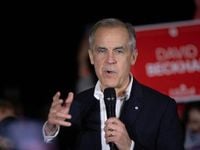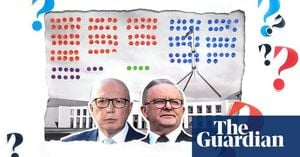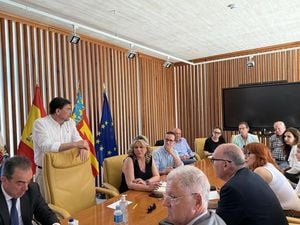OTTAWA — The recent federal election has set the stage for a turbulent political landscape in Canada, particularly in Alberta, where the results have reignited discussions around provincial separation. Mark Carney's Liberals emerged victorious, securing either a majority or minority government, while Pierre Poilievre's Conservatives garnered over 42 percent of the popular vote but fell short in seat count. This outcome has left many Albertans feeling frustrated and disillusioned, as they crave significant change in governance.
As the results rolled in late Monday night, it became apparent that the Liberals would maintain their grip on power for a fourth consecutive term. In Alberta, however, the Conservative Party held strong majorities in many ridings, reflecting a deep-seated desire for more substantial political shifts. "Many Albertans wanted real change, big change, not lipstick on a pig change," noted a political analyst. This sentiment was echoed by Alberta Premier Danielle Smith, who warned of an "unprecedented national unity crisis" if Carney did not address the concerns of the province's oil and gas sector within his first six months.
The election results have sparked renewed calls for a referendum on Alberta's separation from Canada. Cameron Davies, an ex-UCP organizer who supports Alberta independence, expressed his disgust with the Liberal campaign, stating, "Hockey and nostalgia doesn’t pay the bills." He emphasized that without a reimagined confederation, Alberta's separatist movement would gain traction. Smith's government is expected to lower the number of signatures required for a referendum ballot, making it easier for Albertans to voice their opinions on the matter.
In the wake of the election, many Albertans are questioning whether Carney can effectively govern without alienating the province. If he intends to treat Alberta as previous Liberal governments have, he may face significant backlash. Carney has stated that he understands Alberta, having grown up there over 40 years ago, but skepticism remains high among residents. They are tired of what they perceive as Liberal arrogance and neglect.
Polls indicate that a substantial portion of the population feels that Alberta is treated unfairly by the federal government. In rural Alberta, 67 percent believe their province is not receiving its fair share, and a recent survey revealed that 30 percent of Albertans would consider voting for separation if the Liberals were re-elected. This sentiment is not limited to Alberta; 33 percent of Saskatchewanians feel similarly. Historical context further complicates the situation, as Alberta's grievances date back to policies like the National Energy Program implemented by Pierre Trudeau, which many blame for economic downturns in the province.
Smith's UCP has been vocal about the need for a more favorable relationship with Ottawa. She hinted that if the Liberals continued their current policies, Alberta would explore its options, including a potential referendum. "Albertans will no longer tolerate the way we’ve been treated by the federal Liberals over the past 10 years," Smith stated in a social media post. However, she also expressed a desire to work within Canada, emphasizing that she is not a separatist.
Despite this, the separatist movement is gaining momentum. Davies, who recently resigned from the UCP, is pushing for a new political vehicle to facilitate Alberta's exit from confederation. "I am shocked by the number of people that I’ve had conversations with who have expressed that they’ve never thought themselves a separatist, but now believe it might be their only choice," he remarked. This echoes a growing sentiment among many Albertans who feel increasingly disconnected from federal policies that they believe undermine their interests.
As the political climate evolves, some analysts predict that Carney's government will need to tread carefully to avoid further alienating Alberta. He could potentially win over disenchanted voters by committing to projects that support the province's oil and gas industry, such as pipelines and lifting emissions caps. However, if he continues to pursue strict environmental regulations, the backlash could be severe, particularly from the UCP and its supporters.
Meanwhile, the independence movement has been organizing steadily, with plans for a meeting of Alberta separatists scheduled for April 30, 2025. This gathering could further galvanize support for a referendum and may lead to increased pressure on the provincial government to take action. Smith's administration is expected to face mounting demands from constituents who are eager for change.
In Taber, Alberta, a strong sense of libertarian values and cowboy culture permeates the community. Many residents express a desire to join the United States, feeling that their interests are better aligned with their American neighbors. "They’re pushing a lot of their agenda over here that we don’t agree with," said Jake Fehr, a local resident. This sentiment reflects a broader trend in rural areas, where frustration with federal policies runs high.
Despite the growing separatist sentiment, not all Albertans support the idea of leaving Canada. Some, like 81-year-old Brian Waldie, appreciate the diversity within the country and prefer to work towards change from within. "I’m a Canadian, and I like Quebec. I’m glad they have that language and their law. We’re Canada," he stated.
As Alberta grapples with its political future, the prospect of a referendum looms large. With a significant portion of the population expressing dissatisfaction with the federal government, the coming months will be crucial in determining whether the province moves towards separation or finds a way to reconcile its interests within Canada. Whatever the outcome, it is clear that Alberta's voice will be a powerful force in shaping the nation's political landscape.





